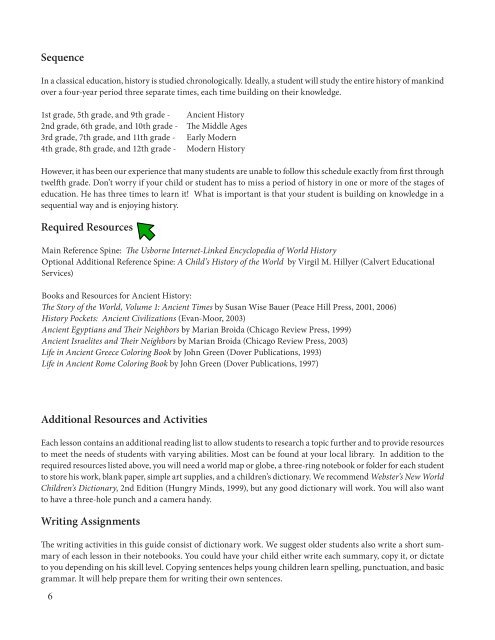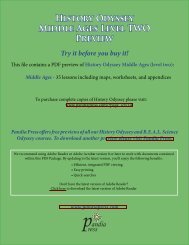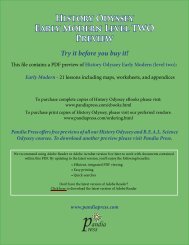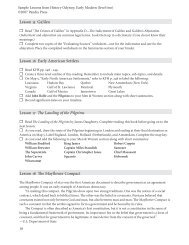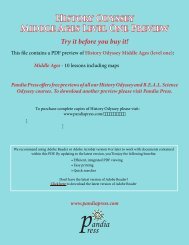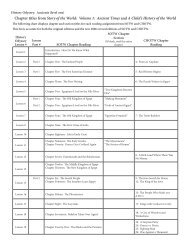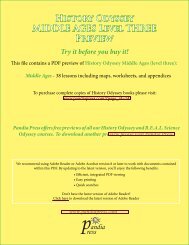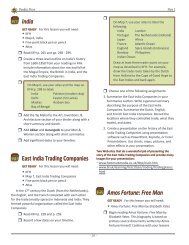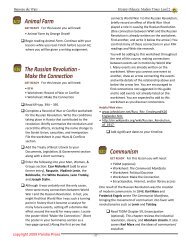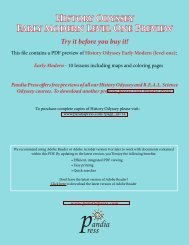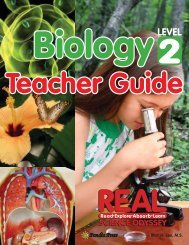History Odyssey - Ancients (level one) eBook Preview - Pandia Press
History Odyssey - Ancients (level one) eBook Preview - Pandia Press
History Odyssey - Ancients (level one) eBook Preview - Pandia Press
You also want an ePaper? Increase the reach of your titles
YUMPU automatically turns print PDFs into web optimized ePapers that Google loves.
Sequence<br />
In a classical education, history is studied chronologically. Ideally, a student will study the entire history of mankind<br />
over a four-year period three separate times, each time building on their knowledge.<br />
1st grade, 5th grade, and 9th grade -<br />
2nd grade, 6th grade, and 10th grade -<br />
3rd grade, 7th grade, and 11th grade -<br />
4th grade, 8th grade, and 12th grade -<br />
Ancient <strong>History</strong><br />
The Middle Ages<br />
Early Modern<br />
Modern <strong>History</strong><br />
However, it has been our experience that many students are unable to follow this schedule exactly from first through<br />
twelfth grade. Don’t worry if your child or student has to miss a period of history in <strong>one</strong> or more of the stages of<br />
education. He has three times to learn it! What is important is that your student is building on knowledge in a<br />
sequential way and is enjoying history.<br />
Required Resources<br />
Main Reference Spine: The Usborne Internet-Linked Encyclopedia of World <strong>History</strong><br />
Optional Additional Reference Spine: A Child’s <strong>History</strong> of the World by Virgil M. Hillyer (Calvert Educational<br />
Services)<br />
Books and Resources for Ancient <strong>History</strong>:<br />
The Story of the World, Volume 1: Ancient Times by Susan Wise Bauer (Peace Hill <strong>Press</strong>, 2001, 2006)<br />
<strong>History</strong> Pockets: Ancient Civilizations (Evan-Moor, 2003)<br />
Ancient Egyptians and Their Neighbors by Marian Broida (Chicago Review <strong>Press</strong>, 1999)<br />
Ancient Israelites and Their Neighbors by Marian Broida (Chicago Review <strong>Press</strong>, 2003)<br />
Life in Ancient Greece Coloring Book by John Green (Dover Publications, 1993)<br />
Life in Ancient Rome Coloring Book by John Green (Dover Publications, 1997)<br />
Additional Resources and Activities<br />
Each lesson contains an additional reading list to allow students to research a topic further and to provide resources<br />
to meet the needs of students with varying abilities. Most can be found at your local library. In addition to the<br />
required resources listed above, you will need a world map or globe, a three-ring notebook or folder for each student<br />
to store his work, blank paper, simple art supplies, and a children’s dictionary. We recommend Webster’s New World<br />
Children’s Dictionary, 2nd Edition (Hungry Minds, 1999), but any good dictionary will work. You will also want<br />
to have a three-hole punch and a camera handy.<br />
Writing Assignments<br />
The writing activities in this guide consist of dictionary work. We suggest older students also write a short summary<br />
of each lesson in their notebooks. You could have your child either write each summary, copy it, or dictate<br />
to you depending on his skill <strong>level</strong>. Copying sentences helps young children learn spelling, punctuation, and basic<br />
grammar. It will help prepare them for writing their own sentences.<br />
6


